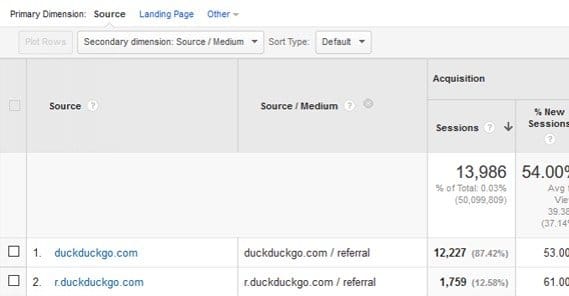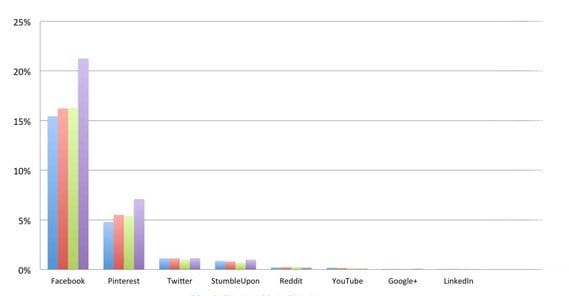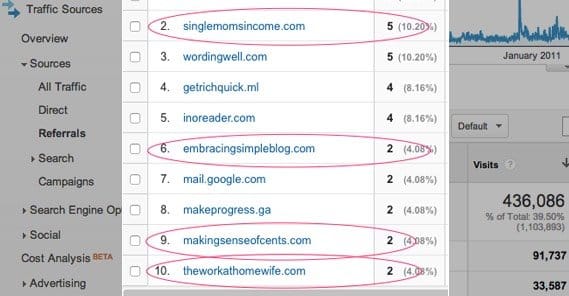Huge List of Free Traffic Sources to Get More Visitors

Getting traffic to your site doesn’t have to be expensive. In fact, there are a ton of sources of traffic you can tap into for free. Some will take more of an investment of time than others will, but that’s just the nature of the game. When you want to get something for free, you’re just going to be paying for it in a different way.
Some of the traffic sources on this list will be obvious, others less so. Yes, we all know organic traffic from search engines is great, but we’re also all getting it already. It’s the other, smaller sources you really want to dig into.
The big one is, obviously enough, Google. Google organic traffic is going to be the central pillar of your free traffic, and your SEO efforts are going to be aimed squarely at working better with Google. However, there are plenty of good reasons to diversify, to move away from total reliance on Google and paid traffic.
- An algorithm change can knock down your site at a moment’s notice and lead to large expenses in cleaning it up.
- Your site can be hit by negative SEO or another detrimental action out of your control and still take a hit.
- A new competitor can outrank you and drive down your organic traffic, making it harder to do business.
- Any hit to organic traffic drops your sales figures, which can in turn hurt your budget for paid advertising, while simultaneously making you need to spend more on paid traffic to make up the difference.
There’s a reason why many businesses try to diversify, after all. So what other traffic sources are there?
Other Search Engines
The big other search engine people recommend is, of course, Bing. Bing and Yahoo have something of an alliance, with Yahoo taking their data primarily from the Bing index, so appealing to either one is the same as appealing to both. SEO for Bing is a little different than it is for Google, though. Exact match keywords tend to have greater weight, for one thing. Bing also has a bit more of an emphasis on links from edu and gov sites.
There’s also other search engines. Ask, Dogpile, IxQuick, and so forth; these are all minor. However, one search engine seems to be gaining market share and exposure, and that’s DuckDuckGo. It has been trending in the wake of Google privacy concerns and some clever marketing from the DDG staff. It’s something you should, at least, pay some attention to.
Social Media
You had to know social media would be on the list. I generally recommend that a site only have a presence on 2-3 social networks, at least while they’re small. It’s a lot of work to maintain, engage, and update a social network profile, and keep its messaging consistent with your branding. You can always spay someone to do it for you, but then it’s not a free traffic source, is it?
- Facebook is the big one, with over a billion users and an extensive selection of tools you can use to reach them. It’s also the one every business should be using, with a few exceptions.
- Twitter is second place as far as social networks go, and it’s primarily useful for news, time-sensitive updates, contests, and following trends in world culture. It also has a special role as an excellent location for customer service.
- Instagram is huge, and their merger with Facebook gives you access to many of the same marketing tools. However, while it’s great for engagement, it only works if you have a distinct visual brand or a way to capitalize on visual exposure.
- Pinterest is a smaller social network and suffers from the same drawback as Instagram, that being a reliance on visual media, but it’s exacerbated by a narrower focus and a narrower audience.
Reddit is also worth a special mention here. It’s a cross between a social network and a web forum, which is a traffic source we’ll discuss later. Reddit is one of the largest sites online, and the entire focus of the site is based around posting links and discussing the content of those links. A lot of the content you see trend on Facebook or Twitter is trending because Reddit got hold of it and started engaging with it. However, Reddit is a very tricky platform to use for marketing. You have to avoid approaching it like a marketer, because Reddit users are like piranhas. If they sense you trying to use their audience for money, they’ll swarm you and savage you until you feel like you can’t use the site again. Make sure to read up and take great care before trying to market on Reddit.
Another special mention is Quora. The question and answer site is like a high class, actually-useful version of the defunct Yahoo Answers. Experts find questions in their industry to answer and provide detailed answers, either in the form of a moderately lengthy post, or in a post that links out to their websites. You, too, can take advantage of industry questions by answering them the best you can. Users can vote on the most useful answer, and it floats to the top, so the more useful you can be, the more exposure your link will get.
Specialized Sites
Specialized sites are sites with a firm specialization that has led to a lot of traffic on their part. If you can tap into that traffic, it can be very good to you, but you need to be a site in the right sort of niche to take advantage of it. I’ve listed a few examples, but there are plenty more out there.
IMDB: This site is #1 when it comes to movies and TV shows. Getting a link from IMDB can be worth a ton of value, but they don’t link out to just anyone. However, that’s not reliable or even plausible for most people. Instead, you need to turn to the one location you’re free to post; the IMDB forums. These forums have a huge audience and narrow topics, and like Reddit or web forums in general, they can be great places to show your expertise, link to your content, and promote deals.
BuzzFeed: Everyone knows the primary perpetrator of Clickbait and content appropriation on the web, but seemingly few people realize that anyone can write for them. You can sign up for a free account here, and simply start creating content on their site. There’s a lot of content that sees very little exposure on the site, but if something does catch on – perhaps because of your audience and your brand reputation – BuzzFeed will reach out to you and help by promoting it on the main sections of their site.
AllRecipes: This site is one of the larger recipe-focused sites on the web, and it also has a reputation amongst foodies for having a ton of comments about “this recipe was terrible, also I made X, Y, and Z substitutions.” You, too, can take advantage of these recipe comments to promote your own changed version of the recipe, if you have a cooking blog.
Blog Comments
There are always high profile blogs in your industry, no matter what that industry is. It might be sites like Business Insider, Forbes, and Inc. It might be sites like Medium and Gawker. It might be sites like Search Engine Journal and QuickSprout. The fact is, every industry has its dominant forces, and as long as you’re not the dominant blog, you can use the dominant blogs as traffic sources for your own.
Blog comments have a number of sources of value, and traffic is just one of them. By monitoring your competitors and your betters, you get a keen sense of what the industry is doing and where trends are going. You leave valuable comments and people take notice, including industry influencers and possibly the owners of these top-tier sites. You create a gateway back to your site, and even though the links are nofollowed, they’re still links for people to click. You also build a personal reputation as a commenter around your industry, raising sentiment and value.
Comments need special attention to be successful, though. Generally, you will have strict rules to follow. You can’t simply leave a “this was great, hey check out my site” comment. It will either be filtered for spam or it will be ignored. You need an insightful, detailed, and helpful message. You need to expand upon the topic in the post, argue against it, or support it with your own data. The point is to be valuable and attract positive attention.
A link in the comment itself may or may not be called for. I recommend only including a link of you have a post on your site that ties in nicely. If you do, you can use it to expand your comment. “By the way, I wrote a post on this topic as well over here. My conclusions were X and they seem to contradict yours; what are your thoughts?” If you aren’t able to work in a relevant post, limit your link to in your profile for the comment, where the website field sits.
Finally, you need to avoid using a keyword-based or URL-based name for your comment. Your name as a writer or CEO is much better than a brand name. You’re in it to be personal, not impersonal.
Forum Comments
Forum comments work much the same way as blog comments, except you tend to lack the base post from which to play off. Instead, you need to invest some time into getting to know the culture of the forum, the prominent users, the rules, and the discussion flow. If people generally post one sentence at a time, adding a 3,000 word post will be excessive and may be mocked. If people tend to post lengthy discussions, short posts may have a negative effect. And, like Reddit, some sites may be very rabid about enforcing no advertising.
Forums are probably one of the least effective forms of free traffic, but it all depends on the forum. You’re looking for large, active communities where you can carve out a bit of a reputation for yourself. Sure, you can dominate a small forum, but the returns won’t be worth it. Conversely, too large a site and you may have trouble attracting attention at all. It’s a hard balance to strike.
Interviews
Interviews can be a source of some decent traffic, both in giving and hosting them. On the giving side, you’re building your reputation and you’re gaining links, as the places who interview you publish a link to you as their source. On the hosting side, you publish links to influencers you interview, who have a decent chance of linking to you as a “check out this interview I did” comment somewhere. They have an interest in promoting it, after all.
There are two ways to hook up interviews. The first is the manual option. Identify sites and specific people you want to interview, or who you would like to interview you, and approach them about it. Send them a message asking if they would be willing to interview you, or saying that you’re available if they would like to interview you about something specific related to your industry. In the second case, generally try to have a specific subject they’ve talked about recently, a press release of your own that might intrigue them, or a case study with data they might want to use. Something to sweeten the pot, basically.
The other option is HARO, the Help A Reporter Out website. HARO is a network where you can post “hey, I’m an expert in X” and people who want to interview people about X can contact you. By the same token, you can look for experts in a subject and interview them. It’s a great way to forge these relationships.
Always keep in mind that paid strategies can augment organic traffic building as well. Social media in particular benefits from a bit of monetary investment. However, establishing the organic base first is virtually required.
 ContentPowered.com
ContentPowered.com









Great Information! Thank You!